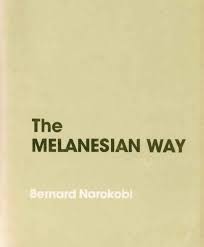The Melanesian Millenial – A Key Citizen in the 'Nation of Villages'
- Jan 13, 2021
- 9 min read
Updated: Oct 22, 2021
The village, a group of houses and associated buildings, larger than a hamlet and smaller than a town, situated in a rural area, is the dictionary’s definition. To me, a Papua New Guinean, a Melanesian Millennial, the village is all that and much more. I know for other Papua New Guineans it also transcends to more. It is a place of belonging and identity far more than just a physical geographic location. It’s where life as we know it began, where the first seeds of our nation were planted, where the growth of our people spurted and life in this land of a thousand tribes blossomed into a unified nation.

Pictured here is part of my village, Kwaian in my hamlet Pavri, in the Yangoru-Saussia district of the East Sepik Province, Papua New Guinea.
The village in the purposes of this article can also be symbolic in a sense where it represents a place in which one draws strength. A communal abode wherein lies a hidden power that gives meaning, identity and an innate sense of belonging to the generations of sons and daughters of this land. I write this article based mainly on the following reasons,
Firstly, I'd like to highlight the importance of understanding the connection that one has to their ancestral home as a Papua New Guinean. Secondly, to reiterate the need to have that connection based on the directive principles found in our constitution, at the same time drawing from the work of one of our founding fathers – Bernard Narokobi. Based off those two main reasons I hope to bring an understanding of how a Melanesian Millennial can navigate between modern and rural societies in our changing world. As Millennials or any citizen younger or older, we need to know our ancestral lands, the village (in this context), and how we can play a vital role in the development of it as well as other sectors of our nation.
Using the words "Melanesian" and "Millennial" are representative of a new generation of young people (born between the years 1981 and 1996) from the Melanesian Pacific Island countries (note that using the term Millennials is a broad reference to those born in the Generation Z era as well). Why I focus on Melanesians instead of the wider Pacific Islander community is because much of our values and village systems of beliefs are similar. Narokobi also wrote the Melanesian Way because he too had our other wantoks in mind for he saw that our collective progress comes by us being united culturally.
Side note: something I would like to establish is “authenticity” as a norm for this platform. Especially in the area of me relaying messages through my writings in prose and for you to have a better sense of connection to me as an author for I write on what I feel resonates with the majority of my target audience.
The Village also meant so much more to our founding fathers, one of which is Bernard Narokobi (who I focused on in a previous article on decolonization and will continue to use much of his work as a muse for my writings). His work resonates with generations of our countrymen for he put into words what we all experience. For the sake of this subject area I point out that he too was a part of the generation that transitioned into the new way of life – from a rural to a more urban society. He was part of the pioneering batch of his time. Studying Law in his final year at the University of Sydney Australia he penned these words in a letter to Margaret Mead clearly showing how his village had a profound impact on his life,
"The more I think about values my tribe hold, the more often I return and live in the village, and the more I see of the Western Way of life, the more convinced I am [that] there is something in my tribe that is noble and worth knowing ..."
Source: Bernard Narokobi, letter to Margaret Mead, 13 May 1970, reprinted in Margaret Mead, ‘Preface to the American Museum Science Book Edition’, The Mountain Arapesh Vol. III: Stream of Events in Alitoa (Garden City, NY: Natural History Press, 1971), xiii–iv.
The ideals of the village are definitely worth knowing and Narokobi knew that. In his book Life and Leadership in Melanesia, Narokobi further emphasizes how the village is an integral part of PNG society,
"if he was going to tell you ‘what the real PNG is all about’, he would have to write a multi-volume treatise on ‘the village’. This multi-volume treatise would be nothing less than a textbook teaching ‘the visitor’ the curriculum of the village, which Narokobi likened to the ‘University of Melanesia’. To him this village curriculum was nearly synonymous with the Melanesian Way, and at the time of PNG’s transition from colony to nation, Narokobi saw in it a powerful potential to ‘radicalise, activate, inspire, and motivate’ the new nation’s citizens”. He characterizes Australia and PNG as ‘two different villages’ with a ‘friendly relation- ship’ and insists that ‘towns, cities, and industries must be ‘villagised’ if Papua New Guineans are to achieve ‘true liberation’. "
Source: Lise M. Dobrin (2020) A ‘Nation of Villages’ and a Village ‘Nation State’: The Arapesh Model for Bernard Narokobi's Melanesian Way, The Journal of Pacific History, 55:2, 165-186, DOI: 10.1080/00223344.2020.1759405.
In his work “Foundations for Nationhood, Sir Narokobi writes, “we are a nation of villages”. The village to him was the jewel in the crown of the Melanesian way and he sought to maintain a connection to his village. The very founding document of the nation, the constitution puts it plainly. Found in the preamble in the fifth and final goal, along with its associated directive principles under the heading Papua New Guinean ways, it states,
We declare our fifth goal to be to achieve development primarily through the use of Papua New Guinean forms of social, political and economic organization.
The village is mentioned under the fourth step,
Traditional villages and communities to remain as viable units of Papua New Guinean society, and for active steps to be taken to improve their cultural, social, economic and ethical quality.
For Narokobi, the Arapesh village of Wautogik in the Prince Alexander Mountains of East Sepik Province (known affectionately as Waut by its residents and close neighbours ) was his home. It was from there that he made sense of the world. As for me, my village is Kwaian, in the Pavri hamlet and is also in the East Sepik Province in the beautiful misty mountain ranges of West Yangoru, a district a little further inland than Narokobi’s. This place, my village, its people, lands, traditions and history is where I draw a sense of belonging and a deeper understanding of who I am.
I was fortunate this past Christmas amidst the ongoing pandemic to travel to my ancestral home. Witnessing life in the village presently at a more mature age and with my exposure to the world, gave me a better level of understanding and appreciation of life in my country. It was generally fascinating observing the lifestyle of the people, trying to understand and comprehend at times their mindset and level of reasoning. I hung on to the advice of my mother before embarking on this trip to leave all my expectations of the village behind and to have an openness to learn and adapt to the conditions there as I go. For me, the trip was fitting for not only was it enjoyable as a vacation, but it was grounding and meaningful for the purposes of my continuous growth in understanding this complex cultural heritage I possess.
From left: Bidding farewell to a few of my little cousins in Kwaian Village, a favorite standard breakfast of ripe plantains (banana) coated in fresh desiccated coconut, the view from my village heading down to the river.
There maybe challenges for you personally hindering you from journeying back to your villages apart from the recently obvious one, COVID. It may be a family conflict that hasn’t been resolved, poor road conditions, the distance, security, harsh living conditions, finances, fears and uncertainty of not fitting in or just the thought of not wanting to forego the comforts of urban life. I get it; I’ve been there. Whether you have the chance to visit or not, never forget your ancestral connection.
I chose to focus on the Melanesian Millennial group of young people for I am one and I believe they/we are key citizens. We represent the shifting period of times in our society. Being typical Millennials I'm sure it'll be much easier for us to view this subject from the context of popular animated superhero films. Let’s be a little light hearted shall we, and take for example certain superheros who return to their homelands amidst a crisis to draw strength to fight their enemies. Superman has Planet Krypton, the Black Panther has Wakanda, and I like to think for the Papua New Guinean, they have their the village. Just like how these superheroes look to their forefathers in their homelands and the power of their bloodline for strength, you look into yours too.
If I am endeavouring to make sense of all of this, imagine all the other Papua New Guineans in the same canoe. We are a generation born into and raised in the transition of a still thriving traditional society as well as a rapidly modernising one. As we attempt to successfully navigate both many times we can’t help but ask ourselves questions in line of, “how do I honor my ancestors in today’s modern world? Do I have to live like them? Talk and reason like them? I believe not, for times are constantly changing. Sure, in your culture you may have a specific way of honoring your ancestors and your elders. With respects to that, I propose you start by knowing your ancestral lands as the basis of other forms of honor.
Being born and raised in the capital city Port Moresby I’ve seen migration into the city by the plane and truckloads by people moving from rural areas. It’s sad to say but we often forget the village in our attempt to develop the city or in our hot pursuits to keep up with the changing times. It’s crucial for us to remember that we cannot move forward as a nation unless we do so collectively and that includes the development of villages. We must remember that Papua New Guinea is not Port Moresby, and that life in the rural areas deserves just as much of our attention.
As millennials and as future leaders of our nation, what kind of citizens will we be if we only focus on developing the modern? We hope to thrive in one but we neglect the other. Let’s be real, you can strive and be developed in all forms of life in the city centers but the village, it’s people, the need will still plague you and pull you back. Your mindset may have evolved but not the Villagers so they will continue to be a burden to you and the nations progress therefore it’s paramount that they have access to further levels of development as well.
"We must remember that Papua New Guinea is not Port Moresby, and that life in the rural areas deserves just as much of our attention"
What caused our forefathers to be daring in their quest for independence and a more unified nation of a thousands tribes? I believe it’s their obligation to the village, to their people, to their lands as stewards and as citizens of not only a local village but realizing that they have a greater calling to a global one – in order to be effective in the global one, they first had to be effective in the local one.
Take Narokobi’s case for instance, I think he was able to make better sense of the country’s present modern society by drawing from the village, from the wealth of wisdom of his ancestors. He understood who he is as a person because he understood where he came from. A link Millenials of today must have if they were to have the upper hand navigating between two contrasting societies. I jump at any opportunity to tell others, especially people of other nationalities about my village for I believe if they are genuine in wanting to know more about me, then they have to first understand what made me who I am.
Narokobi shared in the same joys about sharing his village for while studying law in his fourth year, he writes to Margaret Mead,
Whenever I get the opportunity here in Australia, I tell [people about] my tribe. I feel now that I can feel proud of my tribe and at the same time feel I belong not only to Papua-New Guinea, a nation to be, but to the world community at large ...
My heart yearns for union with nature, with my traditional back- ground and Western conditioning. I think it is possible. If therefore it is possible for one man, it can be possible for a number and so a nation could be born, composed of different elements, all combining in diversity to form a national integration.
From left: Life and Leadership book by Bernard Narokobi, a picture of Narokobi himself, The Melanesian book by Narokobi.
If you’re a millennial, younger, or perhaps even older reading this I’m sure you have hopes to pursue your passions. It’s the culture of the world we live in today. I’m sure at the top of that life goal you may have written "development" of some sorts. Whether it’s self-development, community development, career development etc, you can be sure its one of your life goals.Let me challenge you to view your goal of development in light of the directive principles of the constitution and how your very own development as a Papua New Guinean ties in to the development of the village.
For our impact to be global, it must first be local.
It is my hope that as you’re reading this you too can want to know and follow your ancestral paths. Don’t you want to know why you come from where you come from? Don’t you want to answer to a deeper sense of belonging? Don’t you owe it to your ancestors to at least honor even a fraction of their memory? I reemphasise this and I also hope you remember that if we are to be developed collectively as a nation in our attempts to keep up with the rapidly evolving modern world, we cannot ignore the village for we need to first start where life in this nation actually began. For our impact to be global, it must first be local.













Comments